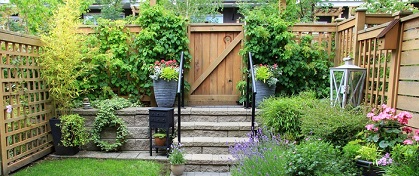If you’re thinking of extending your home – maybe you need an extra bedroom or a larger living space – it’s a big investment.
This is especially true if it means sacrificing some of your garden.
But which is most valuable – extra living space or a bigger garden? We take a closer look.

Cut back the garden
For many, the garden is a tranquil sanctuary. A place we can wind down and relax after a long day. If you love the abundance of the outdoors, your garden may be a key asset that you want to hold on to.
Digging up part or all of your garden to make room to extend your property is a big decision. First impressions are everything when selling your home. And, while a large family-sized garden can be very impressive to potential buyers, a big kitchen can be equally attractive.
This is why it’s important to weigh up your options. After all, the value an extension could add to your home shouldn’t be the only reason for going ahead.
If a garden will add to your quality of life right now, keeping hold of it might be the right thing for you and your family.

Build an extension
One way to transform the look and feel of your home is to extend it. If you’re hoping for an extra bedroom or larger kitchen, extending is probably something you’ve thought about.
There are many types of extension, from single storey to multi-storey, which can help you create your dream property. But before calling the builders, you should think about what you need the extra space for. Perhaps it’s for a bigger bedroom, or maybe a study.
The thing is, while an extension can give you valuable extra space, it’s also expensive and time-consuming to get the work done. If the space it creates is not something your household desperately needs right now, you shouldn’t let the value it could add to your property be the only thing that sways you into doing it.
Although extending you home has obvious benefits, one of the major drawbacks is cost. Typically an extension can set you back thousands of pounds. In the long run this could increase the value for your home, but it’s important to keep in mind that it’s going to cost you in the short term.

Explore other options
It’s worthwhile exploring your options before you look into extending your home. If your rooms are already a reasonable size, have you considered adding dividing walls? These can be a great way of adding an extra room at a minimal cost.
But if you want to create a larger space within your property, making the downstairs open plan could be a great way to achieve this without extending.
Obviously, this will come down to how much space you already have in your property to play with. You’ll need to consider whether this is a practical option before you start removing walls.
Research by ratedpeople.com found that bigger rooms are more likely appeal to buyers. So there’s no point splitting a room into two small, dingy bedrooms if there’s a better solution. Not doing the work well could actually be a turn-off when you look to sell your home.

What about the garden?
It may seem as though buyers are only interested in space and how many bedrooms a property has. However, a garden can be a real draw too. If you have a good-sized home and a small garden, it may be more sensible to keep the outdoor space you have rather than extending on to it.
The thing is, your home is only worth what someone wants to pay for it. And if that buyer wants a garden of their own, your outdoor space could be what tempts them to make an offer.
However, if your property is really quite pokey and you have a spacious garden, it could be worth sacrificing some of your outside space to build an extension. Why not ask around your neighbours to see what they’ve done?
Dig deep
Renovating your home and garden can be expensive. The exact work you have done will all affect the final price you’ll pay, but it could be as much as a five-figure sum.
A secured or homeowner loan may be a suitable option to help you pay for the work. With home improvement loans, you can borrow the money you need and pay it back over a long term, which can help make the monthly repayments more manageable.
Our Smart Search tool lets you check whether you’re likely to be accepted for the loan before you apply. Remember, a homeowner loan is secured against your property, which means your home can be repossessed if you don’t keep up with your repayments.
Disclaimer: We make every effort to ensure that content is correct at the time of publication. Please note that information published on this website does not constitute financial advice, and we aren’t responsible for the content of any external sites.








